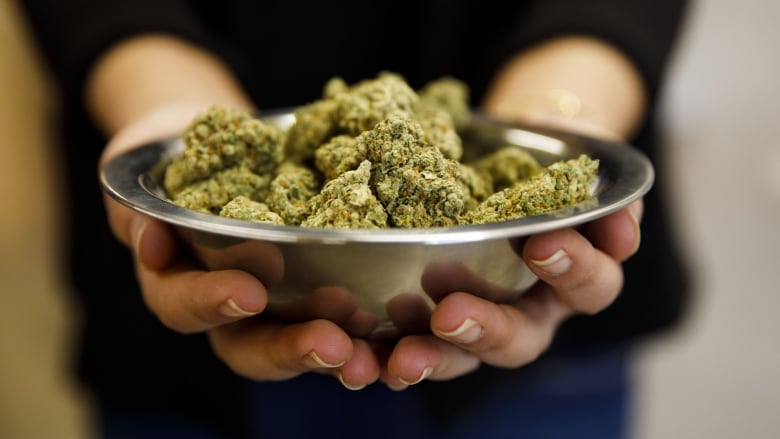Life insurance companies no longer treating marijuana use as high risk as tobacco
Looking to legalization, firms seek young people as long-term clients, broker says

Some of Canada's biggest insurance companies have updatedtheir policies on marijuana use, and the changesare having a major impact onregular users'premiums.
With recreational use of the drug set to become legal on Oct. 17, marijuana is moving toward mainstream acceptance, andthe slow-moving and stodgy world of life insurance is no exception.
One by one, the biginsurance companies have updated their underwriting protocols to move marijuana use out of a high-risk category of activities that includes things like smoking tobacco, and into a pool wherepremiums aren't significantly affected.
"They saw the writing on the wall in terms of legislation," insurance broker Lorne Marr says of the industry's more liberal stance, "but the changes came about a little bit before."
In 2016, Sun Life was among the firstto stop considering marijuana usethe same as tobacco. Others have followed suit. Marr recently surveyed almost every life insurance provider in Canada, and the vast majority now have a similar policy.
"Alot of the guidelines are still a little bit ambiguous," Marr says."But it' s a big change from five or 10 years ago because everybody was getting smoker rates, which is a huge difference in the premiums."
It certainly is. While insurance premiums are based on complicated formulas for a range of factors that include lifestyle and family health history, smoking tobacco is one of the surest signs of risk that insurers charge a premium for.
It variesa little by company, but a basic term life insurance policy for a healthy man in his late 30swould cost about $40 to $50 a month. If he's a smoker, however, that will more than double.
Most insurance applications will rely on people self-identifying various risk factors, but it's not unheard of for an insurer to demand a blood or urine test to validate results, especially in case of a payout.
"On the application, marijuana is going to be one of the questions," Marr says. "They're looking at how much you smoke but they're also looking at otherhealth issues."
While thereassessment of risk factors is notable, Marrsays it's not as if insurers suddenly don't care aboutdrug use. Activities such as using the drug while driving will still be considered high risk.
Companies will also monitor it in conjunction with other risk factors, he says. "Someone who has a combination of marijuana use and depression," Marr says,"that's going to raise a lot of red flags."
The industry is acting in part for competitive reasons if marijuana use is to become even more widespread, they may scare off a growing number of customers with prohibitively high premiums.
"These companies are in the business of acquiring clients," independent insurance broker Jeff Simmons says. "You're trying to acquire young people who are to be in this thing for the long haul."
"They'retrying to acquire clients and this is the best way to keep prices at a level where they can," Simmons says.
Joan Weir, the director of health and disability policy at the Canadian Life and Health Insurance Association, says her group's members set premiums for their own competitive reasons, but she acknowledges that many "have moved to a model whereby as long as it was two or less per week then you would not be a smoker."

That's not to suggest marijuana use has suddenly become risk-free. In a comprehensive report, the World Health Organization lists a variety of health risksassociated with the drug, including bronchitis, other respiratory diseases, cardiovascular issues such as stroke, and many cancers.
The WHO says more research is needed. Finding accurate data on the impact of a drug that is for the most part illegal is difficult.
The Canadian Centre on Substance Abuse and Addictionlists similar concerns.
Dr. Harold Kalant, a professor emeritus at the University of Toronto's School of Medicine and one of the co-authors of the CCSA report, says any move by insurers to downgrade the risk seems premature.
"The trouble is we don't know the exact statistics because it hasn't been a long enough period of time to have good public health epidemiological observations recorded," he said.
Kalant says much of the research has focused on the impact of the drug on young brains, but the core demographic that insurers care about isolder adults.
While he, too, cautions that more data is needed, researchers have recorded a small number of cases where middle-aged men have had heart attacks and strokes linked to the drug, especially in cases where they have circulatory issues.
Data from U.S. states where the drug has been legalized suggests that is the demographicmost likely to use more marijuana after it becomes legal.
"If the proportion of users in the middle-age or older group increases, then that would be a significant risk for health which the insurance companies are not yet really in a position to assess," Kalantsaid. "They are not really going to be in a position to make an accurate decision that will be economically good for them for another fouror five years."
There's also the question of how marijuana is consumed. Many of its known health risks centre on smoking. Other methods of ingesting it such as eating get around that. But Canada's legislation does not mention making edibles legal. That means pot users may not be using it in the healthiest way possible.
"It is still smoke," Weir said. "You're still taking something into your lungs."
Making an accurate assessment of the health benefits and risks, Kalant says, will require more research intohow and how often people consume the drug, and their other risk factors.
"We have to see what the behaviour of the public is," he says, "We really don't have an accurate picture yet."












_(720p).jpg)


 OFFICIAL HD MUSIC VIDEO.jpg)
.jpg)



























































































